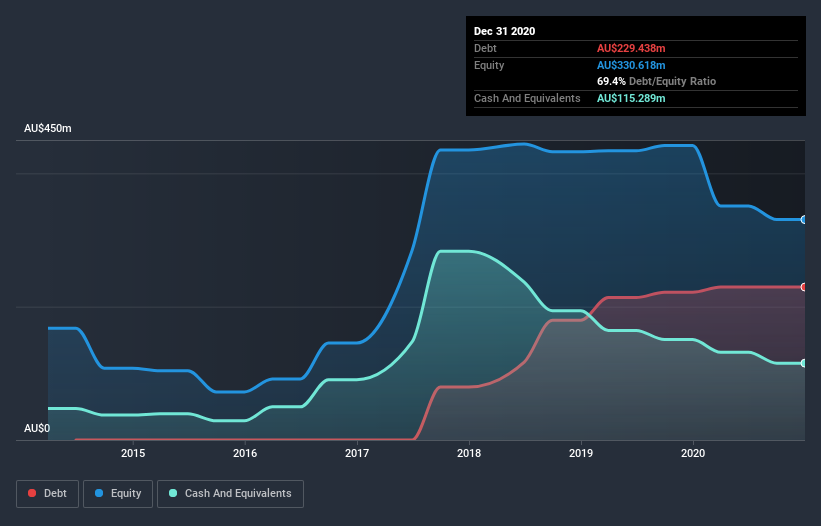The external fund manager backed by Berkshire Hathaway's Charlie Munger, Li Lu, makes no bones about it when he says 'The biggest investment risk is not the volatility of prices, but whether you will suffer a permanent loss of capital.' When we think about how risky a company is, we always like to look at its use of debt, since debt overload can lead to ruin. We can see that Cooper Energy Limited (ASX:COE) does use debt in its business. But should shareholders be worried about its use of debt?
What Risk Does Debt Bring?
Debt and other liabilities become risky for a business when it cannot easily fulfill those obligations, either with free cash flow or by raising capital at an attractive price. If things get really bad, the lenders can take control of the business. However, a more common (but still painful) scenario is that it has to raise new equity capital at a low price, thus permanently diluting shareholders. By replacing dilution, though, debt can be an extremely good tool for businesses that need capital to invest in growth at high rates of return. When we think about a company's use of debt, we first look at cash and debt together.
View our latest analysis for Cooper Energy
What Is Cooper Energy's Debt?
The chart below, which you can click on for greater detail, shows that Cooper Energy had AU$229.4m in debt in December 2020; about the same as the year before. However, it also had AU$115.3m in cash, and so its net debt is AU$114.1m.

How Healthy Is Cooper Energy's Balance Sheet?
According to the last reported balance sheet, Cooper Energy had liabilities of AU$119.2m due within 12 months, and liabilities of AU$564.4m due beyond 12 months. Offsetting these obligations, it had cash of AU$115.3m as well as receivables valued at AU$15.4m due within 12 months. So it has liabilities totalling AU$552.9m more than its cash and near-term receivables, combined.
Given this deficit is actually higher than the company's market capitalization of AU$521.9m, we think shareholders really should watch Cooper Energy's debt levels, like a parent watching their child ride a bike for the first time. Hypothetically, extremely heavy dilution would be required if the company were forced to pay down its liabilities by raising capital at the current share price. There's no doubt that we learn most about debt from the balance sheet. But it is future earnings, more than anything, that will determine Cooper Energy's ability to maintain a healthy balance sheet going forward. So if you're focused on the future you can check out this free report showing analyst profit forecasts.
Over 12 months, Cooper Energy reported revenue of AU$88m, which is a gain of 12%, although it did not report any earnings before interest and tax. That rate of growth is a bit slow for our taste, but it takes all types to make a world.
Caveat Emptor
Over the last twelve months Cooper Energy produced an earnings before interest and tax (EBIT) loss. Its EBIT loss was a whopping AU$148m. Considering that alongside the liabilities mentioned above make us nervous about the company. It would need to improve its operations quickly for us to be interested in it. Not least because it burned through AU$35m in negative free cash flow over the last year. That means it's on the risky side of things. When I consider a company to be a bit risky, I think it is responsible to check out whether insiders have been reporting any share sales. Luckily, you can click here ito see our graphic depicting Cooper Energy insider transactions.
At the end of the day, it's often better to focus on companies that are free from net debt. You can access our special list of such companies (all with a track record of profit growth). It's free.
If you’re looking to trade Cooper Energy, open an account with the lowest-cost* platform trusted by professionals, Interactive Brokers. Their clients from over 200 countries and territories trade stocks, options, futures, forex, bonds and funds worldwide from a single integrated account. Promoted
New: Manage All Your Stock Portfolios in One Place
We've created the ultimate portfolio companion for stock investors, and it's free.
• Connect an unlimited number of Portfolios and see your total in one currency
• Be alerted to new Warning Signs or Risks via email or mobile
• Track the Fair Value of your stocks
This article by Simply Wall St is general in nature. It does not constitute a recommendation to buy or sell any stock, and does not take account of your objectives, or your financial situation. We aim to bring you long-term focused analysis driven by fundamental data. Note that our analysis may not factor in the latest price-sensitive company announcements or qualitative material. Simply Wall St has no position in any stocks mentioned.
*Interactive Brokers Rated Lowest Cost Broker by StockBrokers.com Annual Online Review 2020
Have feedback on this article? Concerned about the content? Get in touch with us directly. Alternatively, email editorial-team (at) simplywallst.com.
About ASX:AEL
Amplitude Energy
Engages in exploration, development, and production of natural gas and low-cost oil in Australia.
Good value with reasonable growth potential.
Similar Companies
Market Insights
Community Narratives




